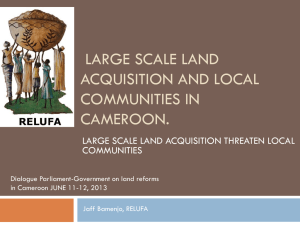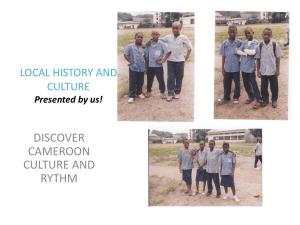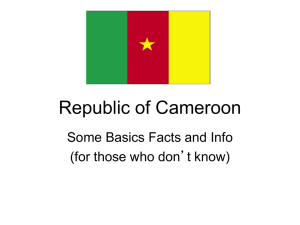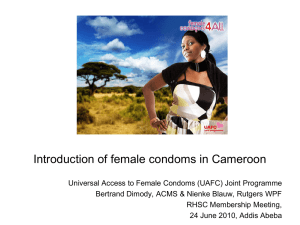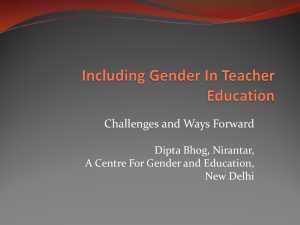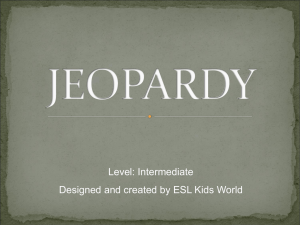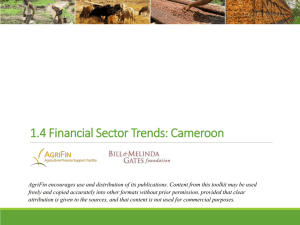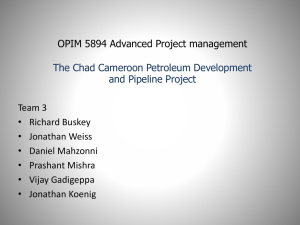Name of NGO Women in Alternative Action
advertisement
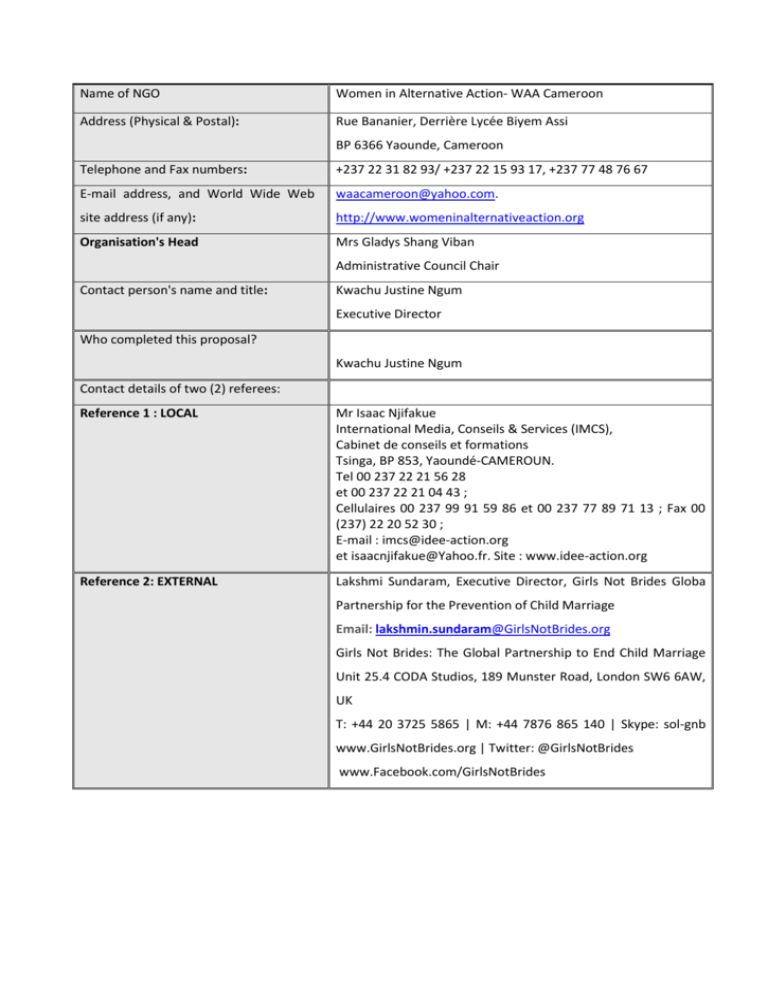
Name of NGO Women in Alternative Action- WAA Cameroon Address (Physical & Postal): Rue Bananier, Derrière Lycée Biyem Assi BP 6366 Yaounde, Cameroon Telephone and Fax numbers: +237 22 31 82 93/ +237 22 15 93 17, +237 77 48 76 67 E-mail address, and World Wide Web waacameroon@yahoo.com. site address (if any): http://www.womeninalternativeaction.org Organisation's Head Mrs Gladys Shang Viban Administrative Council Chair Contact person's name and title: Kwachu Justine Ngum Executive Director Who completed this proposal? Kwachu Justine Ngum Contact details of two (2) referees: Reference 1 : LOCAL Mr Isaac Njifakue International Media, Conseils & Services (IMCS), Cabinet de conseils et formations Tsinga, BP 853, Yaoundé-CAMEROUN. Tel 00 237 22 21 56 28 et 00 237 22 21 04 43 ; Cellulaires 00 237 99 91 59 86 et 00 237 77 89 71 13 ; Fax 00 (237) 22 20 52 30 ; E-mail : imcs@idee-action.org et isaacnjifakue@Yahoo.fr. Site : www.idee-action.org Reference 2: EXTERNAL Lakshmi Sundaram, Executive Director, Girls Not Brides Globa Partnership for the Prevention of Child Marriage Email: lakshmin.sundaram@GirlsNotBrides.org Girls Not Brides: The Global Partnership to End Child Marriage Unit 25.4 CODA Studios, 189 Munster Road, London SW6 6AW, UK T: +44 20 3725 5865 | M: +44 7876 865 140 | Skype: sol-gnb www.GirlsNotBrides.org | Twitter: @GirlsNotBrides www.Facebook.com/GirlsNotBrides ORGANIZATIONAL INFORMATION a. organisation's main goals Main goal Contribute to gender justice, peace and sustainable opportunities for women, youth and the girl child in Cameroon and the Central Africa sub-region. Sub Goals: □ b. Date of creation Intensify activities that protect Women and girls from harmful cultural/religious values and practices □ Enhance the economic, and social empowerment of the Underprivileged /underserved, women and youth □ Propose adapted/favourable draft laws/policies through Strategic channels □ Foster pro gender partnerships on national and international instruments. □ Gender, Peace and security. November 5, 2004 c. Geographic coverage Based in Yaoundé but covers the entire country. d. Main beneficiaries Women, young girls: Female domestic workers, Female political activists/human rights/Defenders, Female sex workers; Female refugees/Internally displaced/asylum seekers, Indigenous women/from ethnic groups; Women and girls in general, Women/girls with disabilities, Women/girls living with HIV and AIDS, Women/girls survivors of violence. Organisational strengths, weaknesses, opportunities and threats Strengths WAA Cameroon’s strength lies in her ability to manage her networks based on long term field experience and good networking relations with key stakeholders. WAA Cameroon’s governing structures are well established. A General Assembly of more than 1000 multidisciplinary members, a Board of 09 and a staff made up of multidisciplinary professionals. Recently upgraded administrative documents of the organization Statutes, Procedural Manual, Internal rules and regulations, and Staff Handbook, reflect a desire to be outstanding in service delivery. The organization is well equipped with all office equipment and material resources necessary for high grade performance. WAA Cameroon has an extensive network of women leaders in Cameroon, including community women’s groups, legal experts and finance institutions, corporate advocate groups in Douala, Bafoussam, Garoua, Maroua, Ngoundere, Bertoua, Ebolowa, Buea, Bamenda and Yaoundé with whom WAA implements major projects. WAA Cameroon has several long-term projects in rural Cameroon and is familiar with the challenges specific to the rural Cameroonian context. Undeniably, WAA Cameroon is an organization committed to excellence, with a clear vision and a passion for delivering outstanding results. Weakness WAA Cameroon does not have a stable funding source. This limitation has a consequential effect on staff remuneration and a more negative impact on staff stability. Most trained staff move onto greener pastures as we are unable to financially retain them. Also, with this position, we employ less skilled and experienced staff. Threats Fears of political instability consequential to the Boko Haram Terrorist group, fierce competition from financially viable organizations, a working environment that is not accommodative and receptive of innovations and target beneficiaries Opportunities A mobilized Civil Society network of actors, an ongoing decentralization process that will be used to foster our goals and objectives, mobilised traditional institutions ready to transform harmful; cultures and to empower women. Project summary WAA Cameroon wants to offer trainers training support on livelihood development in mushroom and dry fruits, to 150 indigent Mbororo women facing integration difficulties due to their poverty and nomadic lifestyles. This will take place in three regions of Northern Cameroon considered the poorest. WAA will equip trainers with start off material and equipment while supporting their young children to attend free informal literacy classes to enhance their access to education. Main Problem Mbororos are among the poorest, low income and low literate ethnic people of Cameroon. They feel rejected and live nomadic and recluse lives. They are vulnerable as a result, are frequently attacked and looted by armed groups. Their concerns are for economic and social stability and to ensure their children’s education as other ethnic communities do. There are more than 20000 Mbororo women spread across the 3 northern regions of Cameroon who have deep integration difficulties, lack support services to make their lives better and who due to the nomadic pastoralist culture of their husbands, live recluse and very unstable lifestyles. Due to lack of dialogue with the other community members and the authorities, Mbororos in general and the women in particular, are impeded from enjoying their full civic and socio-economic and political rights, and have little or no access to economic services. Their concerns are for safety and security as they live in almost quasi insecurity and fear of the unknown attackers and looters of their property. This prevents them from realizing their constitutional rights. They have little or no access to justice; inadequate opportunities towards socio political and economic services open to the dominant ethnic groups, and are marginalized and discriminated against officially and by these dominant groups in the country. Solution This project targets to benefit 150 of the 20000 Mbororo women spread across the national territory of Cameroon. WAA Cameroon wants to support these women with vocational training in livelihood opportunities as this is necessary for them to take total control of their destiny and use it to influence household development and community perception. The project will also provide opportunity for Mbororo children to attend informal literacy classes. The 150 women are trained as peer trainers in practical skills related to mushroom production, fruit drying as well as marketing and support towards accessing suitable markets for their products. Each peer trainer will organize further training sessions in their various communities for 75 community members to replicate learning and expand the number of beneficiaries of the project. This will prepare them to create community thrift and loan cooperatives which will gather their products and negotiate market prices for them. Project Objectives Global Objective Vulnerable ethnic Mbororo women are able to reassert their lives and contribute to household and community development prospects. Specific Objectives o Mbororo Women and their families living in marginalized recluse lifestyles are able to access appropriate livelihood and vocational trainings necessary to generate income and improve their living conditions. o Marginalised Mbororo children are able to access informal literacy education facilities that enable them to fully integrate their communities. Expected Results: o o o Peer trainers take greater action to ensure the multiplier effects of the project. There is improved knowledge and greater community interaction among Mbororo children and children of other ethnic groups. An agenda for the creation of thrifts and savings schemes initiated Impact The project will train 150 Mbororo women in livelihood support programmes and enable them to rise out of poverty, provide for their families’ health and well-being and contribute to educating their children in formal education facilities. Planned Activities o o o o Train 150 peer trainers in 3 training sites on fruit drying and Mushroom production. Provide Sub grants to support the training work of 150 peer trainers in their communities Provide education facilities to 200 Mbororo Children Monitor and mentor the creation of 03 Thrift and Savings Cooperatives in 03 project sites Relevance of the action The action will facilitate direct networking among Mbororo women and also spread learning through the entire Mbororo ethnic group, which includes recruiting another 11250 Mbororo women in the different communities. The action adopts an approach where Mbororos themselves maintain ownership of their own development process, with WAA Cameroon playing a mentorship role. This recognizes that Mbororos themselves are the key change agents, playing strategic roles to foster the objectives of the project. Finally, we recognize that to realise more resilient Mbororo communities will require that the activities are designed to facilitate dialogue and develop trust between Mbororo ethnic group and other ethnic groups in those areas to facilitate Mbororo women and children integration. . Methodology Technical Training Technical expertise in livelihood development and follow-up mentoring support provided are key in our professional livelihood development programme. These trainings will focus on skills, knowledge and experiences that relate to income generation and specifically on fruits drying and mushroom cultivation and production. During the trainings 30 participants will be identified as peer educators in each of the three regions concerned to conduct training and expand the beneficiaries of the project. Sub-grants Training and sharing opportunities alone may not secure the kinds of changes that Mbororos require. Sub grants to enable them experiment their learning and expand the scope of beneficiaries is necessary. Also, multiplying learning to others may be a way of raising the level of visibility of the project and attract more funding for Mbororo livelihood development. Partnership development Partnerships are key to Mbororo integration. Living recluse live styles does not help them and their children. The project pays a lot of emphasis on developing partnerships between Mbororo ethnic groups and other ethnic groups in the regions, both for the sake of marketing their products and for the education of the children. Project sustainability plan The project addresses the issue of skill building for economic purposes. Capacity building for livelihood among Mbororo women is essential in providing financial and material sustainability. While the project will focus on livelihood development for long term plans, it will also initiate a meaningful dialogue between other ethnic groups and the Mbororo women in terms of their children education. Education especially of their girl children is very rare among the Mbororos while early marriage is more common: most of Mbororos’ women are illiterate and highly dependent on their husbands for basic needs and do not have the possibility to express themselves and to interact socially because of the strict adherence to their religion and the severe respect of the traditional belief that women’s place is at home. In conformity with the government’s effort to support Mbororos through the Ministries of Social Affairs and Women’s Empowerment and the Family, We will work to promote education for Mbororo girls and to increase their participation in the family unit and in community decision-making. In order to achieve this goal, the action will include free books donations, seminars and workshops addressed to Mbororos people about the importance of enrolling girls in school. Scolarisation of Mbororo girls is sustainable means of attaining our long term plans and attaining the SDGs. As the Secretary General Koffi Anan said, when you teach one woman you succeed to teach a whole community. EXPERIENCE OF SIMILAR ACTIONS WAA Cameroon as an organisation committed to achieving a society in which no woman or girl has to live in fear of violence, has proactively designed and carried out programmes and activities intended to raising awareness and eliminating small arms and light weapons related violence against women. Over the past five years, WAA has delivered projects focused on training, and empowering women and youth to take up leadership in the economic and democratic process in Cameroon. The Youth Alternative Programme (2008) and the Queens for Peace International project (since 2009) utilizing youths and wives of traditional authorities respectively to engage and participate in democratic governance processes in Cameroon. These efforts have demonstrated that engaging youths and women advocates have directly supported and promoted women and youth participation in democracy and governance in Cameroon. WAA has also piloted a project with Mbororo women. WAA is a member of Girls Not Brides: Global Partnership to End Child Marriage, Women Peacemakers Program, the International Action Network on Small Arms (IANSA), Global Partnership for the Prevention of Armed Conflict (GPPAC), the Central African Action Network on Small Arms and Light Weapons. WAA has Special Consultative Status with the United Nations Economic and Social Council (ECOSOC) and contributes to the ECOSOC functional commission for women’s work by reporting on the implementation of SDGs and CEDAW. Budget ACTIVITY Training of 150 participants in one of 3 training sessions. Production of demonstration equipment for fruit drying in each of the 03 trainings sites. Support the production of demonstration material (seeds, saw dust, crushed corn cobs...) for the production of Mushroom in each of the 03 trainings sites. Transport, lodge and feed 150 participants to the peer trainers training in the 03 training sites. Transport support to each of the four workshop facilities in the 03 training sites. Stipend to 21 volunteers each month to teach 200 Mbororo children in the three project sites. Buying of basic school needs (uniforms, pens, pencils, rulers and exercise books and reading material ...) for each of the 200 children. Provide 05 seating infrastructures to each of the three sites of the project. Administration Total Unit QTY Amount in USDs UP 3 50 60 9000 3 2 75 450 3 2 80 480 3 50 85 12750 3 4 100 1200 21 12 50 12600 1 200 40 8000 3 1 20 12 90 10 5400 120 50000
